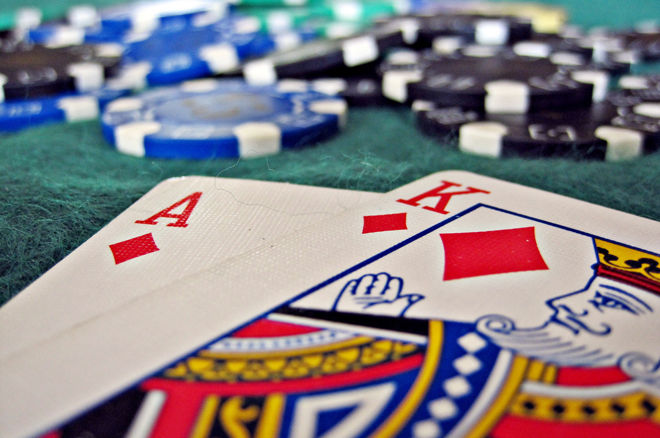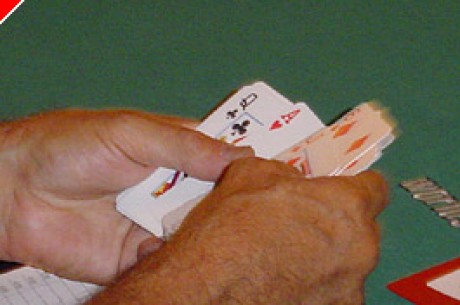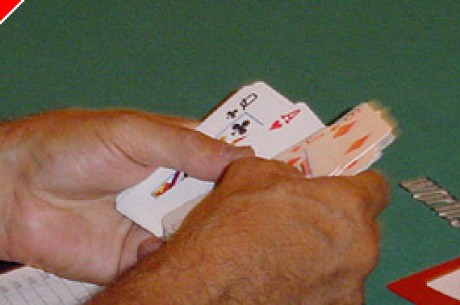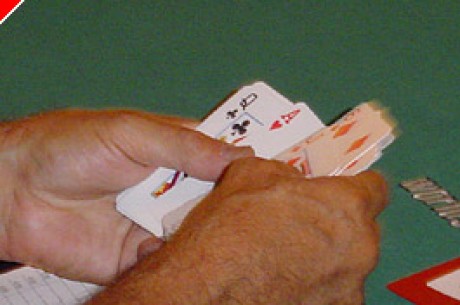Stud Poker Strategy: The Semi (Demi) Bluff

I have a concept to introduce that may make you laugh. I don't mean it to be funny. It's won me money. But maybe it will strike you as absurd. You be the judge. Here it is.
Let me start with three concepts you're probably familiar with: a value bet, a bluff, and a semi-bluff. A value bet is a bet with a hand that figures to be the strongest hand at the time the bet is made. If you're dealt (A♥9♥)As and raise the bring-in, you are raising as a value bet.
We all know what a bluff is. It's a bet meant to make an opponent think your hand is stronger than it really is usually with the intent of getting him to fold. If you have (9♠8♠) K♠J♠Tc 3♣ (2♣) and bet on the River representing that you have a flush, when you really only have a King high, you are bluffing.
You may also know what a semi-bluff is. It is a bluff with a back-up plan. It is a bet made with a hand that may also improve to either being the best hand on the next card or looking like it's the best hand on the next card. If you have 7♥9♥Ah 6h and raise you hope everyone will fold but you also have a good chance of making a strong hand on the next card. That's a semi-bluff.
But here's the new concept. It is a semi-demi-bluff. It combines a semi-bluff with a value bet. It can win as a bluff, or win by improving to the best hand on the next card, or it may actually be the best hand when the bet is made.
Here's an example. You're not confident that you have the better hand. So you can't make a pure value bet. But your bet is not a complete bluff either because you may have the better hand. And you have the possibility of improving to the best hand on the next card.
Consider this hand. You have an Ace up with a King and 9 in the hole (K♥9♥)A♣. A 4 brings it in and everyone else folds. You raise the bring-in. You have three ways to win the pot. First, you might win as a bluff if your opponent incorrectly views your hand as a pair of Aces and she folds her smaller pair. Second, you might win as a semi-bluff if your hand improves on Fourth Street to the better hand by catching an Ace or a King. And, finally, you might actually have the better hand right then with your Ace-King high. In other words, your hand has sufficient value to warrant a bet when combined with the other factors.
Here's a Sixth Street example of a semi-demi bluff.
The hand is heads up and you have: (K♦9♠)4♦, 7♦, 9♦, 9♥ 4♥. You are up against a fairly good, reasonably tight player with:
(Xx)J♠ 8♠ 3♦ 8♥
He has bet the whole way. And he bets here on Sixth Street. Raising here is a semi-demi-bluff. You probably do not have the better hand, since his early betting indicated that he probably had a pair of Jacks to start. You probably won't succeed in getting him to fold, and you aren't at all certain that you will improve to the better hand on your next card. But, when you add up all of the possibilities of the value bet, the bluff, and the chance of hitting your hand on the final card, these three possibilities are probably sufficient to make this the correct play.
Look at it more closely. You've paired your 4s giving you Two Pair, 9♠ and 4♠. You put him on a higher Two Pair because of his betting – but you have to allow for the possibility that you are mistaken in that assessment and that he may only have the pair of 8♠ – or 8♠ and a smaller pair. What's the possibility in numeric terms? Hard to say, but let's roughly just say it's 10-20% — 15% on average. The pot is fairly large at this point since he's been betting and you've been calling the whole way. There's only a small chance that he will fold to your bluffing attempt — but there's some chance. Let's roughly estimate it at 20%. There's also about a 28% chance that you'll make either a Flush or a Full House (20% for the Flush and 8% for the Full House).
Add up all of these possibilities. 15 + 20 + 28 = 63% chance that you'll win the pot as a result of this move. One large bet to give you a 63% chance of winning more than four large bets. That's an excellent bet, no?
Semi-demi-bluffs shouldn't be made routinely of course. There are many times when either the value of your hand, the chance that you will win as a bluff, or the chance that your hand will improve are not sufficient to warrant a bet. But the key is to recognize that the intrinsic value of your hand can make a bet worthwhile, when it wouldn't otherwise be as just a plain semi-bluff. Food for thought, no?
Ed Note: Do you want to chat in your own language at the poker table? Everest Poker's software allows you to see chat in many different languages.








